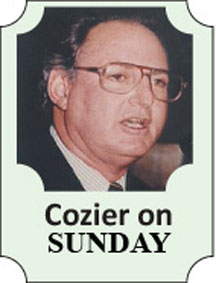There has never been a better time to be a West Indies cricketer.
They have more opportunities for regional and international competition at every level. They are better paid than they ever were, not only by the West Indies Cricket Board (WICB) but more especially by the burgeoning number of global Twenty20 franchise tournaments.
Retainer contracts that also extend to some local boards provide them with the confidence of security. And their interests are well served by a strong union.

Come the end of 2013 a total of 94 players would have appeared over the past two years under the West Indies banner for the senior team, the ‘A’ team, the under-19s and the HPC.
In that time, counting those to come in November and December in India and New Zealand, there would have been Tests, ODIs and Twenty20s Internationals against Australia (home and away), England, New Zealand (home and away), Bangladesh, Zimbabwe and India.
There was the triumph in the Twenty20 World Cup in Sri Lanka last October followed by the ODI letdowns of the Champions Trophy in England and the tri-nations with India and Sri Lanka and the head-to-head against Pakistan at home.
The ‘A’ team hosted (and had the better of) their Indian equivalents in 2012 and Sri Lanka last June. They start a return series in India today.
The under-19s participated in their World Cup in Australia just over a year ago, beating the eventual champions India in the first round before falling away to finish sixth; the new bunch is scheduled for seven one-day youth internationals against Bangladesh in Guyana next month. The HPC toured Bangladesh last year.
Regionally, there are the annual regional first-class and limited overs tournaments as well as those for under-19s, under-17s and now under-15s.
Yet, in spite of such extensive exposure and possibilities for the players, West Indies cricket continues to stagger, as it has done since the turn of the millennium. Several young players have excited expectations only to inexplicably fall away.
The rise to No.5 in the ICC Test rankings announced yesterday is the highest place the West Indies team has reached in over a decade. It is encouraging but for it to be maintained at every level the issues responsible for its stagnation need attention – and quick.
Most are so obvious they have been identified several times over – the state of pitches, the standard of umpiring, the bloated size of a WICB whose members refuse to accept commissioned reports that it be reduced, infighting within the various administrations.
Graeme West, the Englishman who is head coach at the HPC, addressed the question of pitches last week.
As it is located in Barbados, the HPC players were, for the first time this year, assigned to various clubs in the Barbados Cricket Association (BCA) top division.
West described the pitches as “the toughest in the region”; his take on it was that they would help his charges adapt to such surfaces.
“The players who weren’t from Barbados found it tricky sometimes,” he said. “They had to blend new methods and tactics in the crease with slightly foreign conditions. They took some time to get off.”
The obvious conclusion is that, according to West, “these are the best kinds of pitches for young bowlers to refine their trades”; the obvious corollary is that they are not the best for young batsmen. It is one explanation why Barbados, the island of the Three Ws, Sobers, Hunte, Nurse, Greenidge and Haynes, no longer produces batsmen of that quality.
Barbados’ batting in the last regional under-19 tournament, seen on the live streaming on the WICB’s website, made for painful watching. The Leewards (birthplace of the great Viv Richards and of Richie Richardson) were not much better.
Conditions might have been a factor but it appeared more a matter of mental approach. It seemed the batsmen’s first option against spin was to block. Barbados occupied 43.3 overs raising their all-out 99 against Jamaica; they needed 86.3 overs, 44 of them maidens, in scoring 149 against Trinidad & Tobago – and so on.
Generally, the first inclination of youth is to be adventurous and aggressive. The coaching through their developing years would explain such a negation of this attitude.
Rudi Webster, the one-time West Indies manager and psychologist, made the point recently in a thoughtful article in an Indian publication.
“There are now more academically qualified coaches in the Caribbean than ever before,” he wrote. “Yet the need for good coaching has never been greater.
“In the last two decades, our cricket has plummeted,” he continued. “Players must take responsibility for their development and performance but they will not reach their potential in a coaching environment that inhibits smart thinking, the expression of natural talent and the improvement of self-belief, self-confidence, self-discipline and self-reliance.”
This is not to say that West Indian coaches all inhibit smart thinking and surpress talent and confidence. Yet, instead of taking umbrage at such opinions, they might judge themselves against them.
West on pitches and Webster on coaching were joined during the week by Curtley Ambrose on the situation in Antigua that largely reflects that in Barbados and the West Indies as a whole.
Clearly distressed by the fact that his island of 80,000 that once produced himself, Richards, Richardson, Jacobs, the Benjamins and a host of other terrific players, Ambrose said “an overhaul of the entire system” was needed for a revival.
“I believe that the whole structure needs to change from schools level and come right up,” he said. “You can’t change the top level when the bottom isn’t good. You have to start from the grassroots.”
There has been a change in the leadership of the Antigua Cricket Association in the past year. Perhaps that will make a difference, perhaps not.
On the wider stage, the question remains. Is anyone listening?




